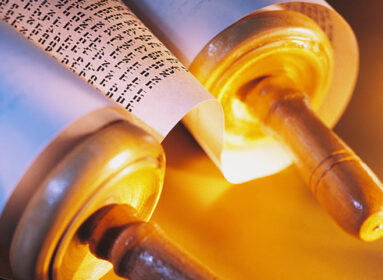
By Shlomo Riskin
“And he erected the courtyard around the sanctuary and the altar, set up the screen gate of the courtyard; and Moses completed the work.” [Ex. 40:33]
Why repeat all the details of the construction of the Mishkan after we have already heard them when they were initially commanded? Would it not have been simpler to deal with the entire execution of external building, furnishings and priestly garb with the single verse: “And the People of Israel built the Mishkan exactly as God commanded”?
In order to understand the significance of the repetition, it is important to remember that the Almighty desires an intimate relationship between Himself and the People of Israel. That is why they are commanded to build a Mishkan in the first place: “that I may dwell among them” [29:46].
However, worshiping the golden calf was a betrayal of the ideals given at Sinai. In effect, the Israelites committed adultery, scarring the love and intimacy God had just bestowed upon them. Were God only a God of justice, this would have been the demise of the Jewish people, their sin mandating a punishment that would have meant the end of the Abrahamic mission.
But since God is also a God of compassion, He forgives. However, can we legitimately expect forgiveness for as heinous a crime as idolatry? Will the Almighty take Israel back even after they have committed adultery?
Herein lies the true significance of the repetition of each and every painstaking instruction regarding the Mishkan. God places His nuptial “home” with Israel before they sin with the golden calf, and God accepts their construction of the nuptial home after they have sinned with the golden calf. The repetition is a confirmation that the intimacy between God and Israel has been restored, that the relationship between God and His bride, Israel, has returned to its original state of mutual commitment and faith. The repetition of the exact details is essentially God’s gift of forgiveness.
It is interesting to note that on the weeks when we read the concluding portions of Exodus, the calendar is usually host to another sequence of special readings, wherein a second Torah scroll is removed from the ark for an additional reading as well as a special haftorah reading from the prophets.
The first special reading is Shekalim, which speaks of the obligation of every Jew to give a half-shekel to the Mishkan. This represents an act of commitment: a pledge of a four thousand year-strong covenantal relationship between God and Israel, demonstrated in our daily lives by the giving of our “half-shekels” to build our sanctuaries – yeshivas and synagogues, day schools and outreach centers – thus bringing God within our midst. Financial commitment is also the traditional halakhic form of betrothal (symbolized in the wedding ring).
The second special Sabbath – immediately preceding Purim – is Shabbat Zakhor: “Remember” to destroy the evil Amalek. Shabbat Zakhor always precedes Purim because in Shushan there were two threats: externally, from Haman, the descendant of Amalek; while internally, the Jews themselves, who, deep in the amnesia of assimilation, were seduced by the invitations to the parties at the palace of Ahashverosh, with all the non-kosher wine and shrimp one could enjoy.
Israel, betrothed by the shekel to God, had succumbed to the temptation of Amalek, substituting the temptations of gold and licentiousness for their God-groom.
The third special Sabbath, Parah, symbolizes the process of purification. The People of Israel, having defiled themselves, are reminded by God that even when our impurity stems from death, the highest degree of impurity, He has provided the red heifer to spiritually cleanse us.
Finally, the namesake for this Sabbath’s special reading, HaHodesh, brings us towards a new beginning. “Hodesh,” the Hebrew word for month, is also bound up with “hadash” [new] and “hidush” [renewal]. In effect, the moon is the messenger of change and renewal, the ability to emerge from total darkness to a state of fullness and perfection.
Thus the special portions of Shekalim, Zakhor, Parah and HaHodesh parallel the portions of Terumah, Tetzaveh, Ki Tissa and Vayakhel-Pekudei. The journey begins with commitment and love, stumbles through failure and sin, and concludes with the possibility of purification and renewal. These stages mark the path of individual and national freedom, culminating in the festival of freedom, Passover.
Rabbi Shlomo Riskin is Chancellor of Ohr Torah Stone and Chief Rabbi of Efrat, Israel.








 Southern New England Jewish Ledger
Southern New England Jewish Ledger










